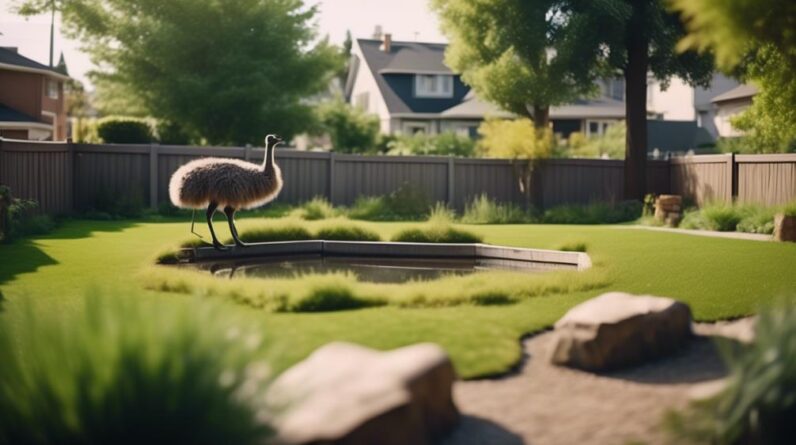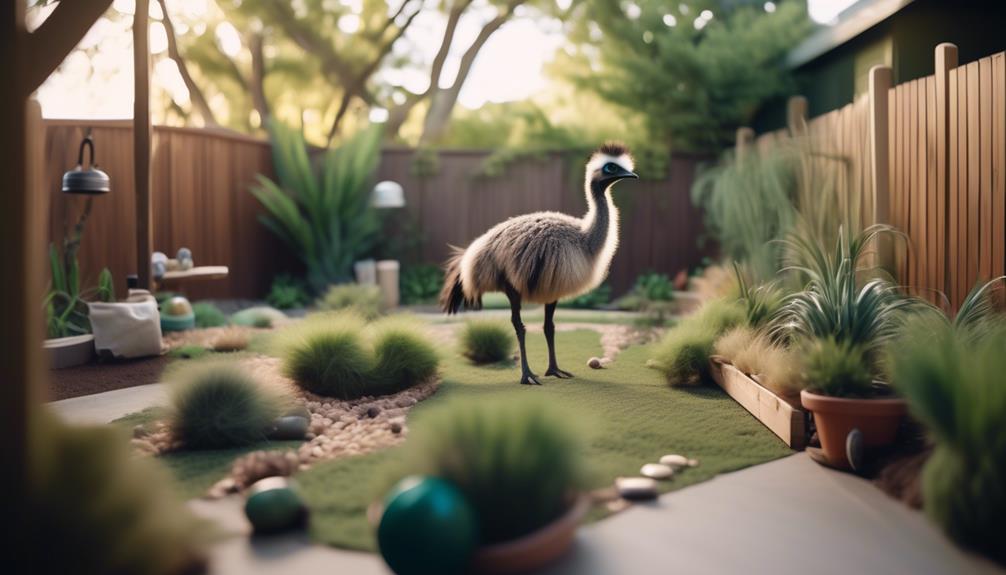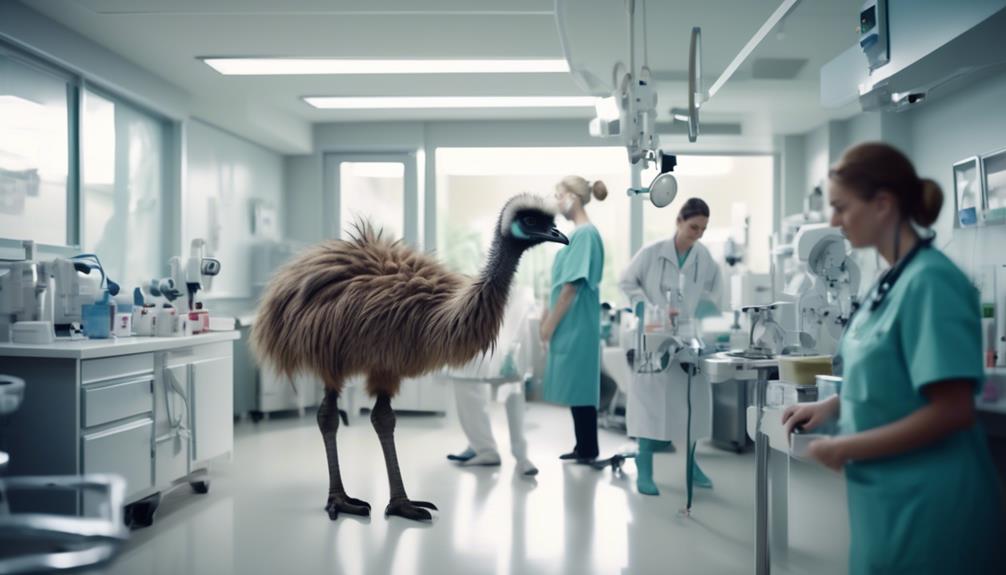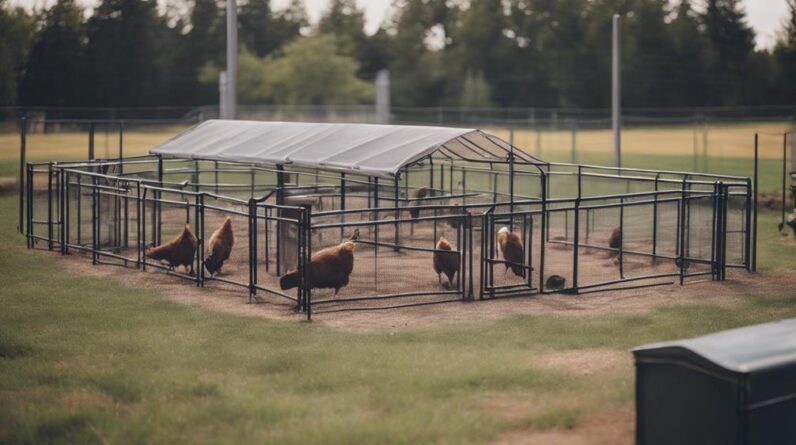
Imagine a bustling cityscape, where towering skyscrapers and bustling streets are the backdrop to the daily rhythm of urban life. Now, picture in the midst of this concrete jungle, a peculiar sight – a flock of emus gracefully navigating the urban landscape. Is it possible to raise these majestic birds in the heart of the city?
Can they thrive amidst the noise and commotion of urban living? In this discussion, we will explore the feasibility of raising emus in urban areas, uncovering the challenges, possibilities, and potential rewards that come with this unique endeavor.
So, let's embark on this urban adventure and discover if raising emus in urban areas is indeed possible.
Emus as Urban Pets

Emus can potentially be kept as pets in urban areas due to their adaptability, low maintenance requirements, and fascinating behaviors. Urban emu care is relatively straightforward, as these birds can tolerate a range of climates and aren't picky eaters. They can adapt to small spaces, making them suitable for urban living. Emus require a secure enclosure, ideally with a minimum of 250 square feet per bird, as they're strong and agile. The enclosure should be tall enough to prevent them from jumping over fences. Emus are social animals and thrive in pairs or small groups, so it's recommended to keep more than one.
Emu behavior is intriguing and can provide endless entertainment. They're curious creatures, prone to investigating their surroundings with their long necks and keen eyesight. Emus are known for their unique vocalizations, which range from soft grunts and hisses to booming calls that can be heard from a distance. They're also remarkable runners, capable of reaching speeds up to 30 miles per hour. Watching them sprint across an open space can be a truly mesmerizing sight.
Space Requirements for Urban Emu Raising
To properly raise emus in urban areas, it's essential to understand the space requirements necessary for their optimal care and well-being. Urban emu enclosures should provide enough space for emus to move around freely, exhibit natural behaviors, and have room to stretch their long legs. Here are some important considerations for creating suitable urban emu enclosures:
- Size: Emus require a large enclosure due to their size and need for exercise. A minimum of 1/4 to 1/2 acre is recommended for a pair of emus. The more space available, the better.
- Fencing: Emus are excellent jumpers, so a secure fence is crucial. A fence height of at least 6 feet is recommended to prevent escapes.
- Shelter: Emus need shelter from extreme weather conditions, such as heat, cold, rain, or strong winds. Provide a sturdy shelter that can protect them adequately.
- Enrichment: Emus are curious birds and benefit from having objects, such as logs, rocks, or branches, in their enclosure. These items provide mental stimulation and encourage natural foraging behaviors.
In addition to the enclosure, urban emu owners should consider urban emu exercise areas. These areas can be designated within the enclosure or outside of it, where emus can have more space to run and stretch their wings. It's important to ensure that the exercise areas are safe, secure, and free from any potential hazards. By providing adequate space and exercise areas, urban emu owners can promote the well-being and happiness of these unique birds.
Feeding and Nutrition for Urban Emus

When raising emus in urban areas, it is crucial to understand the proper feeding and nutrition requirements for these unique birds. Urban emu diets should be carefully planned to ensure they receive all the essential nutrients for their growth and well-being. Emus are omnivorous birds and require a balanced diet consisting of both plant and animal matter.
To meet their dietary needs, urban emus can be fed a combination of commercial emu feed, fruits, vegetables, and insects. It is important to provide a variety of foods to ensure they receive all the necessary vitamins and minerals. Additionally, emus should have access to clean water at all times to stay hydrated.
Below is a table outlining the recommended feeding schedule for urban emus:
| Time | Food |
|---|---|
| Morning | Commercial emu feed |
| Afternoon | Fruits and vegetables |
| Evening | Insects |
It is important to note that the quantities and specific foods may vary depending on the age and health of the emus. It is recommended to consult with an avian veterinarian or an emu expert for guidance on the specific dietary needs of urban emus.
Emu Housing in Urban Areas
Understanding the proper housing requirements for urban emus is essential to ensure their well-being and create a suitable environment for these unique birds. When it comes to urban emu enclosures, there are a few key factors to consider:
- Space: Urban emus require a significant amount of space to roam and exercise. A minimum of 1,000 square feet per adult emu is recommended to promote their natural behaviors and prevent stress-induced behaviors.
- Fencing: Emus are strong and agile birds, so it's important to have sturdy and secure fencing around the enclosure. A fence height of at least 6 feet is recommended to prevent emus from escaping and to keep potential predators out.
- Shelter: Emus need access to shelter to protect them from extreme weather conditions. A simple three-sided structure that provides shade, protection from wind and rain, and a dry area for them to rest is sufficient.
- Environmental Enrichment: Emus are curious, intelligent birds that benefit from environmental enrichment. Providing natural elements such as logs, rocks, and bushes, as well as objects for pecking and scratching, can help keep them mentally stimulated and prevent boredom.
When considering urban emu zoning, it's important to consult local regulations and ordinances to ensure compliance. Some cities may have restrictions on keeping emus within city limits, while others may require permits or specific enclosure guidelines. It's crucial to research and understand these regulations to create a safe and legal environment for your urban emus.
Health and Veterinary Care for Urban Emus

Proper health and veterinary care is essential for maintaining the well-being of urban emus. Emu health is a crucial aspect of raising these magnificent birds in urban areas. As an urban emu owner, you must prioritize the health and well-being of your emus by providing them with regular veterinary services.
To ensure the optimal health of your urban emus, it's important to establish a relationship with a qualified veterinarian who specializes in avian medicine. Regular check-ups and vaccinations are vital to prevent the spread of diseases and maintain the overall health of your emus. Your veterinarian can also provide guidance on proper nutrition and dietary requirements for your birds.
In addition to routine veterinary care, it's essential to monitor the behavior and physical condition of your emus closely. Any changes in appetite, feather quality, or behavior should be reported to your veterinarian immediately. Prompt action can prevent the progression of any potential health issues and ensure the well-being of your urban emus.
Legal and Regulatory Considerations for Urban Emu Raising
To ensure compliance with legal and regulatory requirements, it's important for urban emu owners to be knowledgeable about the specific guidelines and restrictions related to raising emus in urban areas. Here are some key considerations you should be aware of:
- Zoning restrictions: Before embarking on emu raising in an urban area, it's crucial to familiarize yourself with the local zoning regulations. Different areas may have specific rules regarding the types of animals that can be kept, the size of the property required, and the distance between neighboring properties.
- Noise regulations: Emus are known for their unique vocalizations, which can be loud and carry over long distances. Understand the noise regulations in your area and ensure that your emus' vocalizations don't violate any noise ordinances. Consider the proximity of your neighbors and take measures to minimize noise disturbance.
- Permits and licenses: Some jurisdictions may require permits or licenses for keeping emus. Research the specific requirements in your area and ensure that you obtain any necessary documentation before starting your urban emu venture.
- Animal welfare standards: Urban emu owners must adhere to animal welfare standards set by local authorities. Ensure that your emus are provided with adequate space, shelter, and access to veterinary care to promote their well-being.
Frequently Asked Questions
How Much Do Emus Cost to Purchase as Urban Pets?
Emus can be purchased as urban pets, but it's important to consider the costs. Emu ownership involves expenses such as buying the bird itself, providing proper housing and food, veterinary care, and other maintenance needs.
Can Emus Be House Trained Like Other Domesticated Animals?
House training emus is not recommended due to their natural instincts and size. While they can be kept as urban pets, their large size and need for outdoor space make them better suited for rural areas.
What Are the Potential Risks and Challenges of Raising Emus in Urban Areas?
Raising emus in urban areas poses potential health risks and challenges. The practicality of housing these large birds in small spaces must be considered, as it may affect their well-being and the surrounding environment.
Are Emus Noisy and Would They Disturb Neighbors in Urban Settings?
Are emus noisy? Yes, they can be quite vocal. Their unique calls resemble a mix of drum beats and trumpets. While this may be entertaining, it could potentially disturb neighbors in urban settings.
Are There Any Restrictions or Permits Required to Raise Emus in Urban Areas?
To raise emus in urban areas, you should be aware that there might be restrictions and permits required. Make sure to research and comply with local regulations to ensure a smooth and legal process.
Conclusion
In conclusion, raising emus in urban areas is a complex endeavor that requires careful consideration of:
- Space
- Nutrition
- Housing
- Health
- Legal regulations
Just as the emu's majestic feathers symbolize its adaptability, urban dwellers must also adapt to provide suitable living conditions for these unique birds. By understanding the specific needs of emus and adhering to legal requirements, urban residents can create a harmonious environment where these magnificent creatures can thrive.





